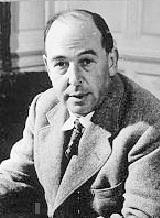Clive Staples Lewis (November 29,
1898 – November 22, 1963), commonly referred to as C. S.
Lewis, was an Irish author and scholar, born into a Protestant
family in Belfast, though mostly resident in England. Lewis is
known for his work on medieval literature and for his Christian
apologetics and fiction, especially the children's series entitled
The Chronicles of Narnia.

Career as a writer on Christianity
In addition to his career as an English Professor, and his novels,
Lewis also wrote a number of books about Christianity — perhaps
most famously, Mere Christianity which is considered a classic work
in the area of Christian apologetics. After some years as an atheist,
he converted to Christianity and joined the Church of England. Although
he became an Anglican, he stated that he was influenced by his Roman
Catholic friend Tolkien. He was very much interested in presenting
a reasonable case for the truth of Christianity. Mere Christianity,
The Problem of Pain, and Miracles were all concerned, to one degree
or another, with refuting popular objections to Christianity.
He has become popularly known as The Apostle to the
Sceptics, because he originally approached religious belief as a sceptic,
and he was converted by the evidence. Consequently, his books on Christianity
examine common difficulties in accepting Christianity, such as "How
could a good God allow pain to exist in the world", which he
examined in detail in his work The Problem of Pain.
Lewis wrote an autobiography entitled Surprised by Joy,
which describes his conversion. (It was written before he met his
wife, Joy Gresham.) His essays and public speeches on Christian belief,
many of which were collected in God in the Dock and The Weight of
Glory and Other Addresses, remain popular today for their insights
into faith.
His most famous works, the Chronicles of Narnia, contain
many strong Christian messages. These are often mistaken for allegory,
but, as Lewis himself said, are certainly not allegory.
Trilemma
The term "trilemma" actually comes from Christian apologist
Josh McDowell, who based it on one of Lewis's best-known arguments
in favor of Christianity from his book Mere Christianity.
According to the argument, most people are willing to
accept Jesus Christ as a great moral teacher, but the Gospels record
that Jesus made many claims to divinity, either explicitly ("I
and the Father are one") or implicitly, by assuming authority
only God had ("The Son of Man has power on earth to forgive sins").
Assuming that the Gospels are accurate, Lewis said there are three
options:
Jesus was telling falsehoods and knew it, and so he
was a liar.
Jesus was telling falsehoods but believed he was telling the truth,
and so he was insane.
Jesus was telling the truth, and so he was divine.
Thus, Lewis maintained that one cannot argue Jesus was merely a great
moral teacher because his moral teachings would be invalidated by
virtue of either his lying or his insanity. On the other hand, if
he was divine, he must clearly be more than merely a great moral teacher.
Portrayals of Lewis' life
Recently there has been some interest in biographical material concerning
Lewis. This has resulted in several biographies (including books written
by close friends of Lewis, among them Roger Lancelyn Green and George
Sayer), at least one play about his life, and a 1993 movie, titled
Shadowlands, based on an original stage and television play. The movie
fictionalizes his relationship with an American writer, Joy Gresham,
whom he met and married in London, only to watch her die slowly from
bone cancer. Lewis' book A Grief Observed describes his experience
of bereavement, and describes it in such a raw and personal fashion
that Lewis originally released it under the pseudonym "N. W.
Clerk" to keep readers from associating the book with him (ultimately
too many friends recommended the book to Lewis as a method for dealing
with his own grief, and he made his authorship public).
|


![]() Books Information
Books Information ![]() Clive Staples Lewis
Clive Staples Lewis